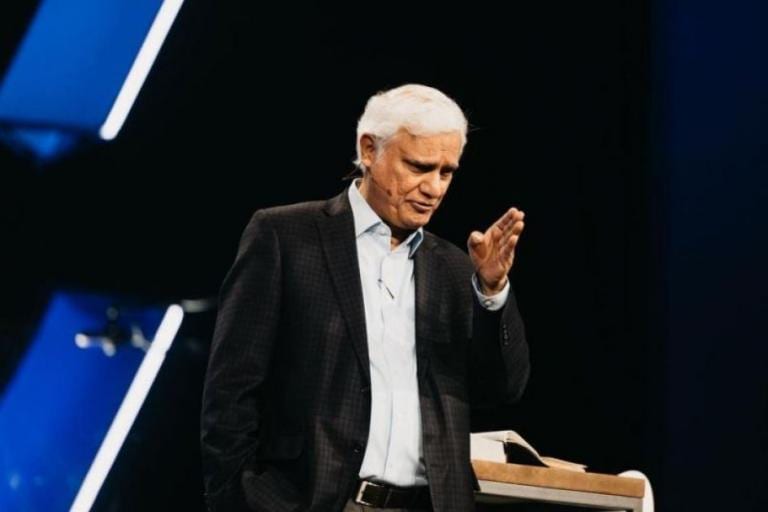
The Ravi Zacharias debacle has rocked the Church and raised important questions of how this could have happened and what it means for the body of Christ moving forward. We cannot let the seriousness of this event be forgotten. It must serve as a constant reminder that when flawed human beings do the work of a Holy God it can be a very risky business.
In a recent episode of Unbelievable? Justin Brierley and Ruth Jackson were joined by Christian psychologist Dr Diane Langberg, a specialist in trauma abuse, Rev Glen Scrivener, an evangelist with Speak Life, and atheist blogger Steve Baughman, to discuss what we can learn from the Ravi Zacharias scandal.
Does Jesus Need the Church?
Has the body of Christ become an empty shell? I don’t know about you but every time I hear another story about a fallen Christian leader my faith takes a hit. I’m sad, I feel beat down, and I wonder if the Church can ever be a faithful witness to Jesus. I’m reminded of a comment Frederick Buechner made in his book The Clown in the Belfry:
“Maybe the best thing that could happen to the church would be for some great tidal wave of history to wash all that away – the church buildings tumbling, the church money all lost, the church bulletins blowing through the air like dead leaves, the differences between preachers and congregations all lost too. Then all we would have left would be each other and Christ, which is all there was in the first place.”
Is he right?
Wolves in Sheep’s Clothing
Scrivener powerfully used the parable of the lost sheep to reveal not only Zacharias’ reprehensible behavior but the Church’s complicity in the whole affair:
“What does an evangelist do but seek after lost sheep… the horror of the one who was meant to be seeking after lost sheep (ends up) devouring those sheep and being himself a wolf in sheep’s clothing. In fact, it’s worse, it’s a wolf in shepherd’s clothing.”
While Scrivener admires the well-intentioned desire of the Church to gather the sheep, he is gravely concerned that it seems oblivious to the wolves in its midst. It is commendable to seek the lost but contemptible if we fail to guarantee their safety once found.
Body of Christ
St. Paul referred to the Church as the body of Christ where Jesus is the head and we are its members:
“Instead, speaking the truth in love, we will grow to become in every respect the mature body of him who is the head, that is, Christ. From him the whole body, joined and held together by every supporting ligament, grows and builds itself up in love, as each part does its work.” (Ephesians 4:15-16)
But what does it mean to be the Body of Christ?
It means we must walk where he walked, talk like he talked, and love as he loved. Jesus was physically present to those he encountered, therefore, we can’t just be talking heads for Christ but must be his hands and feet. We can’t just preach to the predisposed but must be willing to touch the untouchables.
Those who don’t know Jesus need love and not a lecture. While we want people to take our Word for it, we must remember that the world will only be convinced by a warm touch and not more hot air.
Out of Body Experience
Langberg agrees that the Church must be his hands and feet but warns that when we take our eyes off Jesus our body of work becomes a disaster:
“The design of God is the Body of Christ but when that body does not follow its head it is very sick, and the damage is unbelievable.”
Blaise Pascal observed that men commissioned with guiding people to heaven may also be responsible for making their earthly lives a hell:
“Men never do evil so completely and cheerfully as when they do it from religious convictions.”
If we want to be the Body of Christ, we need to make every effort to follow Christ’s lead. The Church needs to stop having an out-of-body experience and spend more time being Jesus’ to the world.
Church Checkpoint
Polls consistently report that young people leave the Church because they see it as hypocritical, shallow, judgmental, and insincere. My children have been hurt by the behavior of those in the Church and it seems the only response I can offer is to tell them to take their eyes off the Christians and gaze upon the Christ. When did the Church become an obstacle to getting to know Jesus?
Sadly, the Church has become a checkpoint where we are put through a moral detector to make sure we don’t smuggle any sins into Jesus’ presence, yet the gatekeepers end up being the worst offenders. The Good News, however, is that while the Church carefully checks our credentials, Jesus slips out the back door and dines with prostitutes and tax-collectors.
When Fruit Goes Bad
Oratory is not one of the fruits of the spirit, yet we seem to use it as a metric for spirituality. We get ourselves into trouble when we confuse elocution with election. As Baughman of Ravi Watch warned in this podcast:
“Never confuse charm for integrity.”
We can’t just accuse Zacharias of being a bad apple when the apple doesn’t fall far from the tree. We are all guilty of letting his fruit rot on the vine and ferment to the point where he got drunk on the power of his own persuasion. Baughman summarized the church’s complicity this way:
“It took an evangelical village to enable him for decades and that’s the real lesson here, it’s not about Ravi anymore, it’s about the system that let him get away with this.”
Langberg echoed his concern by pointing out that we can’t just focus on Zacharias’ deceit because we also deceived ourselves. Deep down we know that if the accusations were true our faith would collapse, so instead of inspecting the foundation we focus on the curb appeal:
“We’re actually not seeking truth, we‘re seeking comfort…We measure fruit externally and not in character.”
Rusty Pipes
Evangelists should be conduits of truth delivering Living Water to the spiritually thirsty but what do we do when the pipe is rusty? It may still hydrate but it ends up leaving a bad taste in our mouths. Throughout history the church struggled with imperfect people delivering God’s perfect love and concluded that even when the vessel is flawed God’s grace is still delivered. The bigger problem is when we treat the pipeline as if it was the fountainhead.
Jesus recruited common laborers, not rabbis and teachers, so maybe he wants vocationally proficient followers rather than eggheads who are all thumbs. Even Paul recognized that his speech lacked eloquence, yet he knew his message was powerful because it was conceived in weakness. Jesus seems happier with blue-collar evangelists rather than golden tongued orators. Maybe the Christian message would be more powerful if we heard from our fishermen and not our pitch men. Scrivener made the important point that truth is not just conveyed but is embodied, which creates a problem for itinerant speakers who are only known through their words and not their actions.
The book of James stated that the tongue is an evil that can distort religion, so we need to make sure that when our charismatic leaders step off the podium they “keep themselves unstained from the world”. As Scrivener stated:
“Life and doctrine are meant to go together.”
“If anyone thinks he is religious and does not bridle his tongue but deceives his heart, this person’s religion is worthless. Religion that is pure and undefiled before God the Father is this: to visit orphans and widows in their affliction, and to keep oneself unstained from the world.” (James 1:26-27)
One of the reasons we get into trouble with charismatic leaders is because the tongue is a part of the head and, as members of the body of Christ, we look up, see the lips move, and inadvertently conflate it with the mind of Christ.
Fallen Integrity
Is it even possible for fallen man to have gospel credibility? How can people whose thoughts are continually evil be sincere? I think we can begin by acknowledging that we are jars of clay and not fine china. We need to stop trying to be at his right or left hand and bend a knee.
Instead of joining Jesus for a cup of coffee to discuss evangelical strategy we need to contemplate what it means to drink from his cup. In a previous blog about fallen leaders, I made the case that Christian leaders need to be servants first because it is very hard to fall from a pedestal when you are mopping a floor.
Grievance Department
The Church seems incapable of providing a system of accountability on its own, so we need to welcome outside voices to help monitor our progress. If the Church doesn’t have a grievance department then our Good News starts to sound like fake news.
We must be willing to listen to those outside the fold because they certainly know a wolf when they see one. The Unbelievable show, by breaking down barriers between believer and unbeliever, is the perfect forum through which we can graciously conduct a conversation with our critics. We need to be cautious of those with axes to grind but must welcome those whose iron sharpens our own.
I began this blog by asking “Does Jesus need the Church?” I want to answer that question with a qualified yes. Jesus certainly needs nothing from us, but he did choose us to be his hands and feet. And all he asks of us is to quit pretending we are the brains behind the operation and let the mind of Christ be our guide.
Watch or listen to the Unbelievable? show responding to the Ravi scandal
Read Justin Brierley’s personal reflection on Ravi Zacharias.












